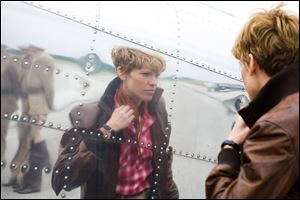
Soap opera-style script gets in the way of Amelia Earhart's thrilling story
10/25/2009
Hilary Swank stars in 'Amelia.'
Amelia has just about everything you want in a biopic: a strong cast, a fascinating subject, and a decades-old mystery that still holds our attention.
And yet the film barely takes flight.
The film is a biography of our most famous female pilot, Amelia Earhart, who in 1937, at the age of 39, disappeared over the Pacific Ocean during an attempt to circumnavigate the world. The movie should be inspirational and emotional, but it's neither.
It is slow, rarely rousing, and spends too much time tangled in the soap-opera escapades of Earhart (Hilary Swank) and her dashing husband, book publisher George Putnam (Richard Gere), and her equally dashing friend, flight enthusiast Gene Vidal (Ewan McGregor).
Amelia skips around in time, to Earhart's fateful flight as she and her ace navigator, Fred Noonan (Christopher Eccleston), attempt to be the first to fly around the world; to her childhood and her fascination with planes that darted across the open Kansas prairie, and to her quest to become the first woman to fly the Atlantic.
It's during a job interview for the latter that Earhart meets Putnam, who is coordinating the flight for a wealthy investor, and who hopes to financially benefit from the trip as well.
The two develop a respectful relationship that grows into something more for Putnam. Despite a blissful romance, Earhart resists his marriage overtures; she considers the institution of marriage too constricting. But Putnam's patience and determination, coupled with the passage of time, dulls Earhart's objections and the two marry.
Putnam is Earhart's biggest champion, the film suggests. He is unwavering in his loyalty to her, even as he grows concerned about her relationship with Vidal. (Gene Vidal was the father of author Gore Vidal, who is featured in the film as a young boy, played by William Cuddy.)
In Putnam, Earhart has an admirer who will do anything for his bride; in Vidal, she has a soul mate who shares her love of the air.
Had the film ignored this awkward love triangle, it would have been a disservice to the truth of Earhart's story. But dedicating so much attention to it necessitates omitting more engrossing, relevant stories about her escapades in the air.
Surprisingly, Amelia isn't helped by its high-caliber screenwriters: Oscar winner Ronald Bass (Rain Man, My Best Friend's Wedding, How Stella Got Her Groove Back) and Anna Hamilton Phelan, who has a history of writing terrific film bios (Mask, Gorillas in the Mist, Girl, Interrupted).
The pair based the script on two Earhart biographies, East to the Dawn and The Sound of Wings, but the film does very little digging into who Earhart was.
Bass and Phelan relegate the aviatrix's formative years to just a few sentences of dialogue, as if Earhart's childhood, which included a difficult upbringing with an alcoholic father, had little to do with her life. As the adage goes, a picture is worth a thousand words, and a minute's worth of dialogue simply doesn't cut it.
Amelia is the second film this year to feature the legendary aviatrix. This summer, Night at the Night at the Museum: Battle of the Smithsonian featured Amy Adams as a peppy Earhart whose can-do spirit and 1930s crackerjack dialogue was the best part of the film.
Swank's interpretation is considerably more subdued, with less bravado and more steely calm. Her Earhart is unflappable and human, a woman who is at her best off the ground, not trying to negotiate the perils of fame and love.
Swank delivers a respectful performance that never overwhelms the screen. It may not win her many Oscar votes because it's not the power-packed performance we've come to expect from her. Gere is a nice choice as the older, smitten Putnam. But McGregor is mostly wasted as Vidal, a role that could have been played by most anyone who can be at once charming and handsome.
Likewise, Indian director Mira Nair (Vanity Fair) brings little to the film. The movie is pretty enough but seems oddly vapid, as if there's more to tell - much like the mystery of Earhart's disappearance. The fateful flight is the best part of Amelia. While it doesn't offer any conclusive evidence of whether she crashed at sea after running out of fuel, or somehow managed to land on a small, uncharted island in Pacific Ocean, it does offer several suggestions, including a mechanical problems, navigational and pilot errors, and simply bad luck.
The same could be said for the film as well.
Contact Kirk Baird at: kbaird@theblade.com
or 419-724-6734.